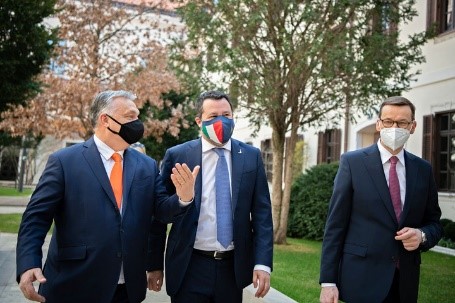Recently, Prime Minister Viktor Orbán had a discussion with Polish Prime Minister Mateusz Morawiecki and Matteo Salvini, the president of the Italian League, about the future of Europe and the possible cooperation of right-wing forces. At the meeting, it was decided to draw up a common program in which, among other things, the protection of national sovereignty, support of families, preservation of Europe's Christian roots, and the rejection of illegal migration and anti-Semitism play a central role.
Based on the results of the Europe Project research, Századvég examined how the European public thinks about the mentioned values and objectives, as well as whether there is a place for politicization based on the principles in question on our continent.
According to public opinion research covering the 27 EU member states and the United Kingdom, three-quarters (75 percent) of European citizens think the problem of the influx of illegal migrants is worrying, and between 2016 and 2020, the proportion of those who believe that most migrants are economic increased from 47 to 57 percent. purpose and in the hope of social benefits comes to Europe. It is questionable to what extent the Brussels elite articulating pro-immigration political interests take into account the mentioned reservations of Europeans in connection with illegal migration.
Examining the issue specifically from the point of view of demographic changes, it can be said that 57 percent of Europeans believe that population decline should not be stopped by promoting migration, but by encouraging childbearing. Thus, while there is a clear voter demand across Europe for the consistent representation of family-friendly policies, the support of migration plays a more prominent role in the policies of the European Commission and the European Parliament.
According to Századvég's survey, the majority of European respondents (55 percent) would preserve Europe's Christian culture and traditions, while the proportion of those who support going beyond Christianity can be put at 35 percent. The left-wing turn of the right-wing forces in Western Europe and the encouragement of migration from a Muslim background necessarily entailed the weakening of commitment to Christianity in Europe, the reversal of which process may become a priority task of the forming Hungarian-Polish-Italian right-wing alliance of values.
For a long time, both the European left and the right treated the Jewish communities as natural allies, and the rejection of anti-Semitic expressions was fixed as a political principle. The development of current political interests, as well as the need to meet the crowds arriving in Europe, often with anti-Semitic sentiments, brought changes in this field as well.
In light of this, it is less surprising that 24 percent of Europeans agree with the statement that they do not feel or would not feel safe as Jews, and that every fourth European citizen (25 percent of those surveyed) sees that there is a difference between Jewish people and non-Jewish people. among Jews.
Based on all of this, it can be concluded that the European Commission and the European Parliament do not take note of several expressed voter demands. After the previously markedly Christian-democratic, center-right forces began to meet the wishes of the left-liberal side, broad sections of the electorate were left without party representation at the European level , as the voters did not fully adapt to the shift in party structures. The emerging right-wing community of values thus has a realistic chance to appeal to those voters who still consider it important to preserve the traditional image of Europe.
more about the survey here .













